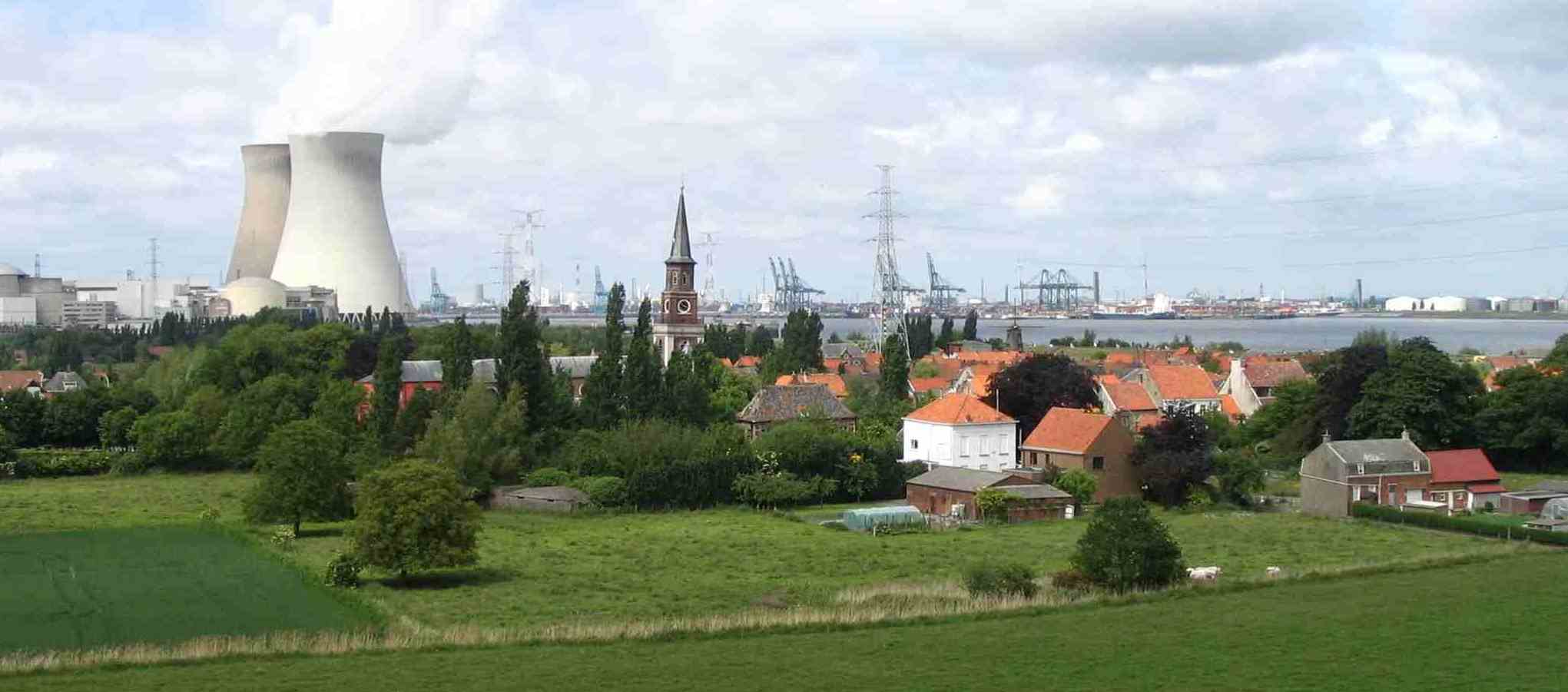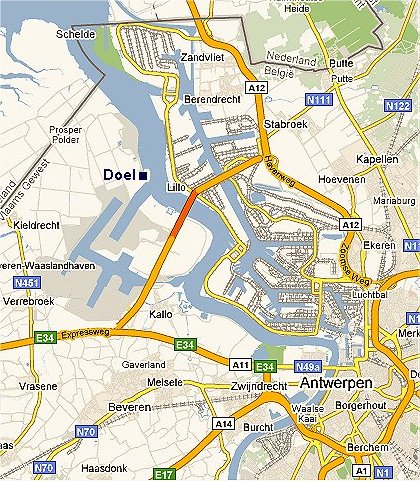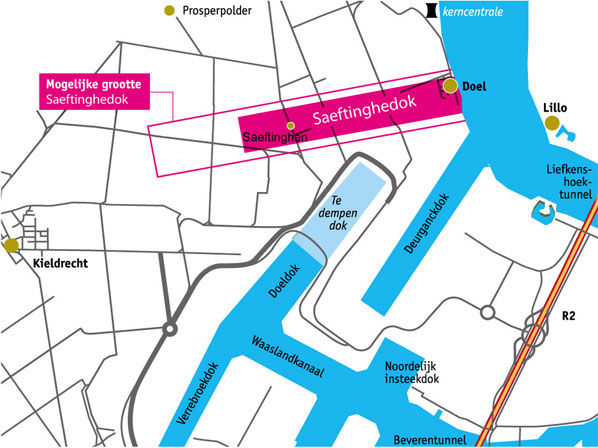
Doel,
The Village That Does Not Want to Disappear
Doel
is a small, 700-year old village in the Belgian polder on the left
bank of the river Scheldt. It is located at a ferry boat trip's
distance from the city/port of Antwerp. Although Doel is only a very
small village, its skyline is well known throughout Belgium and the
Netherlands because it hosts a nuclear power plant with two giant
cooling towers.
By
the early sixties, the ever expanding port of Antwerp had outgrown
available docklands on the Scheldt's right bank and the Antwerp Port
Authority started to build an extensive network of docks,
interconnecting channels, and locks at the left bank, to the south of
Doel. In the early 1970s, the Port Authority ignored farmers' and
villagers' protests and started to expropriate houses in several
polder villages, hereby sacrificing local rural communities to
industrial and economic interests.
 Because
of the port's northbound expansion plans, which also threatened Doel,
the authorities proclaimed a "house building freeze",
obliging young married couples to leave the village and settle
elsewhere for lack of available housing. As a result, the village
began to decline. Successful actions by protest groups and local
politicians in the late seventies, however, managed to temporarily
put a halt to the Port Authority's voracious northbound expansion
plans and Doel experienced well over a decade of renewed hope and
revival. Thanks to the ferry service, the cosy polder village even
became a flourishing tourist attraction.
Because
of the port's northbound expansion plans, which also threatened Doel,
the authorities proclaimed a "house building freeze",
obliging young married couples to leave the village and settle
elsewhere for lack of available housing. As a result, the village
began to decline. Successful actions by protest groups and local
politicians in the late seventies, however, managed to temporarily
put a halt to the Port Authority's voracious northbound expansion
plans and Doel experienced well over a decade of renewed hope and
revival. Thanks to the ferry service, the cosy polder village even
became a flourishing tourist attraction.
Yet, its survival
dreams were relatively short-lived. As of the mid-nineties, plans for
a new dock and two container terminals again tightened the industrial
noose around the community's neck. In 1998/99, the Flemish regional
government signed the village's death verdict by approving the
construction of two new container terminals. The first, Deurganck
dock, has been operational since 2005. It is located just south of
Doel. According to initial plans, the second terminal (Saeftinghe)
was to be built a few years later. If ever it materializes, it will
wipe Doel off the map.
This utterly gloomy prospect led many
disillusioned villagers to "voluntarily" sell their houses
to a semi-public expropriations company. Although the government
promised to keep the village intact until 2007, this company refused
to temporarily rent vacant houses to candidate dwellers, preferring
instead to let the properties go to ruin. This premeditated process
of neglect undermined the village's chances of survival and caused
the number of inhabitants to drop from 900 to 300-400. By the end of
2005, however, the plans for the second container terminal that would
definitively wipe Doel off the map were shelved for an indefinite
period. This sparked renewed hopes that the expansion of the port may
stop at the village's southern border.
 Since
2005, young though mostly responsible squatters have come to the
village and settled in deserted houses, in defiance of the
expropriations company's rental stop. They restored some houses to a
habitable status. By now, many of these "newcomers" have
positively contributed to the village's viability and social life.
Following media reports in 2006 on social tensions, abuses of
utilities, and health hazards, the local district authorities decided
to regularize the situation of all well-intentioned squatters, to
oust troublemakers and to demolish dilapidated houses. Because of
these developments, there was again a glimmer of hope…but on
23 March 2007, the Flemish Government decided that Doel will be
demolished anyway as of 2009, even if the Saeftinghe terminal never
materializes …
Since
2005, young though mostly responsible squatters have come to the
village and settled in deserted houses, in defiance of the
expropriations company's rental stop. They restored some houses to a
habitable status. By now, many of these "newcomers" have
positively contributed to the village's viability and social life.
Following media reports in 2006 on social tensions, abuses of
utilities, and health hazards, the local district authorities decided
to regularize the situation of all well-intentioned squatters, to
oust troublemakers and to demolish dilapidated houses. Because of
these developments, there was again a glimmer of hope…but on
23 March 2007, the Flemish Government decided that Doel will be
demolished anyway as of 2009, even if the Saeftinghe terminal never
materializes …
In June 2008, inhabitants received an
official letter notifying them their houses should be evacuated by 1
September 2009.
Doel
2020 is the inhabitants organisation of the Belgian village of
Doel
•
Read
our English
press releases and information texts
•
Please
contact us at info@doel2020.org
•
More
English language information on our website for the international
business community www.portofantwerp-theotherside.be
•
More
English information also on our cultural website www.kunstdoel.net
©
2008 Doel 2020


